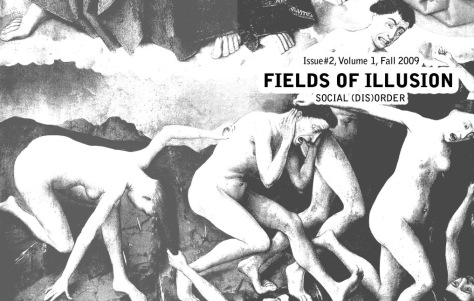
It happened to me just a few months ago. I’d had the experience last year too; an engaged second year undergraduate had been the source of my discomfort some time ago. I am certain it happens in introductory classes on a recurrent basis at the start of each academic year. It probably happened to you at some point as well. “What do sociologists do?” A simple question. An honest question. The problem lies in the repertoire of possible responses to such an inquiry. On the spot and in the eager gaze of a hundred students, I relied on how I’d seen other profs approach this prickly question lately. The students let me speak of the supposed instrumental value of sociology, things like landing a job in government or at a not-for-profit. I highlighted transferable skills that they could put to use outside of academia like reading, writing and critical thinking. They leaned back and forth as I spoke of the importance of research, the link to policy, the virtue of knowledge, the importance of understanding root causes and historical ties between academia and activism. I may have overplayed my hand by the time I was interrupted. “But what do you do?” I had completely misunderstood the question. Collective pause. The emphasis was on doing. What sociologists do?
Lately there has been somewhat of a disjointed set of claims to be doing something: doing/undoing gender; doing/undoing race; doing/undoing ethics; doing/undoing culture; constructing/deconstructing; even one of STS’s ‘sacred cows’, Latour, has famously engaged in reassembling, a moniker for doing. What can all this doing do? Ventures of this kind, particularly when focused on categories of classification or taken-for-granted concepts, can be fruitful and (perhaps this is a page from the ‘social-sciences-as-reflexivity’ playbook) we ought to be engaged as reflexive researchers. But, as H.S. Becker reminds us: sometimes it’s a matter of context.
While departments are increasingly under measurement pressures imported from public administration and business models, the esteemed entrepreneur is said to be capable of harvesting external funding, albeit increasingly from non-traditional sources, to make-up for purloined research money. Alongside dwindling funding is a call to increase research outputs. Here, the traditional types of ‘products’- publications- are most praise worthy, while there exists a hardened reluctance from the administrative vantage point that alternative forms of dissemination, such as zines or social media, can have just as much, if not more, impact and readership. This atmosphere of doing more with less breeds a risk adverse culture towards inquiry where one is hesitant to spend the necessary amounts of time devoted to a single large project or undertake creative forms of research. So it isn’t all that surprising that there has been a rush to doing, a rush to claim importance through tangibles. However, more and more simply calling whatever it is doing isn’t enough. When some of us say we are doing, we are thinking, analyzing, debating, critiquing or challenging. Most often, rightly so. Harper’s comments on committing sociology point to this sensibility, I think.
What this culminates to, from where I sit, is that the university is being positioned as the de facto institution to train its members, its community and its students in how to be resilient. The aspired resilient subject accepts conditions of existence and internalizes strategies and tactics to navigate a given field. Rather than an impetus to change one’s environment, the resilient subject ideally copes and seeks-out contingency plans. The resilient subject is envisioned as capable of withstanding shocks and rebounding from catastrophe amidst uncertainty. The resilient subject is resourceful and instrumental in her perceived daily actions. It is this instrumentalist story that I was led to recite to a classroom of students. It is this focus on instrumentalism that Harper was recalling: don’t think too hard or ask intangible questions. Don’t be political. I remain unsure exactly what it means to commit sociology, but if I had to guess I’d say it’s something like a vocation, a commitment. That commitment is a political one. Maybe it needs to be recognized as such?
Pingback: 3:1— Post-Disciplinarity or “Committing Sociology” — Post 3 of 3 | Installing (Social) Order
I think that’s too easy a dismissal (tho he may have well been saying sit down and shut up in this case) I think they (not necessarily wrongly historically speaking, including the present) understand sociology to be liberal politics/values in the guise of empirical science.
LikeLike
was just responding to this ” Rather than an impetus to change one’s environment, the resilient subject ideally copes and seeks-out contingency plans. The resilient subject is envisioned as capable of withstanding shocks and rebounding from catastrophe amidst uncertainty. The resilient subject is resourceful and instrumental in her perceived daily actions” sounds more prescriptive than descriptive for the field in general.
LikeLike
dmf — not sure I get your question exactly — if we commit sociology ourselves (in the PM’s terms) then do you mean “nothing actually happens”? OR, is it something different? Something like — get political and you’re no longer committing sociology, but do sociology and you’re no longer being political?
LikeLike
The phrase “committing sociology” appears to me to mean that too — I wrote about it Michael’s comments — but you say it even better today: “don’t think too hard or ask intangible questions. Don’t be political.”
So, what’s that mean? Seems to be a nice formulation of anti-intellectualism without being openly anti-intellectual. An important piece of the neoliberal game is “don’t ask questions” and, in particular, don’t ask government or corporations to justify their activities too much.
Thoughts?
LikeLike
that may be the “ideal” but if we commit a bit of sociology ourselves don’t we by and large find the exact opposite?
LikeLike